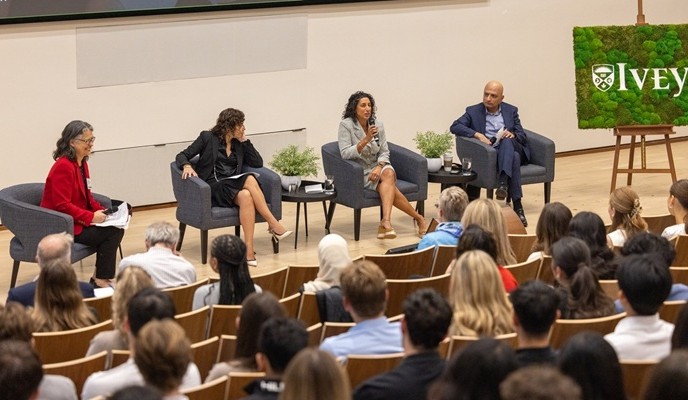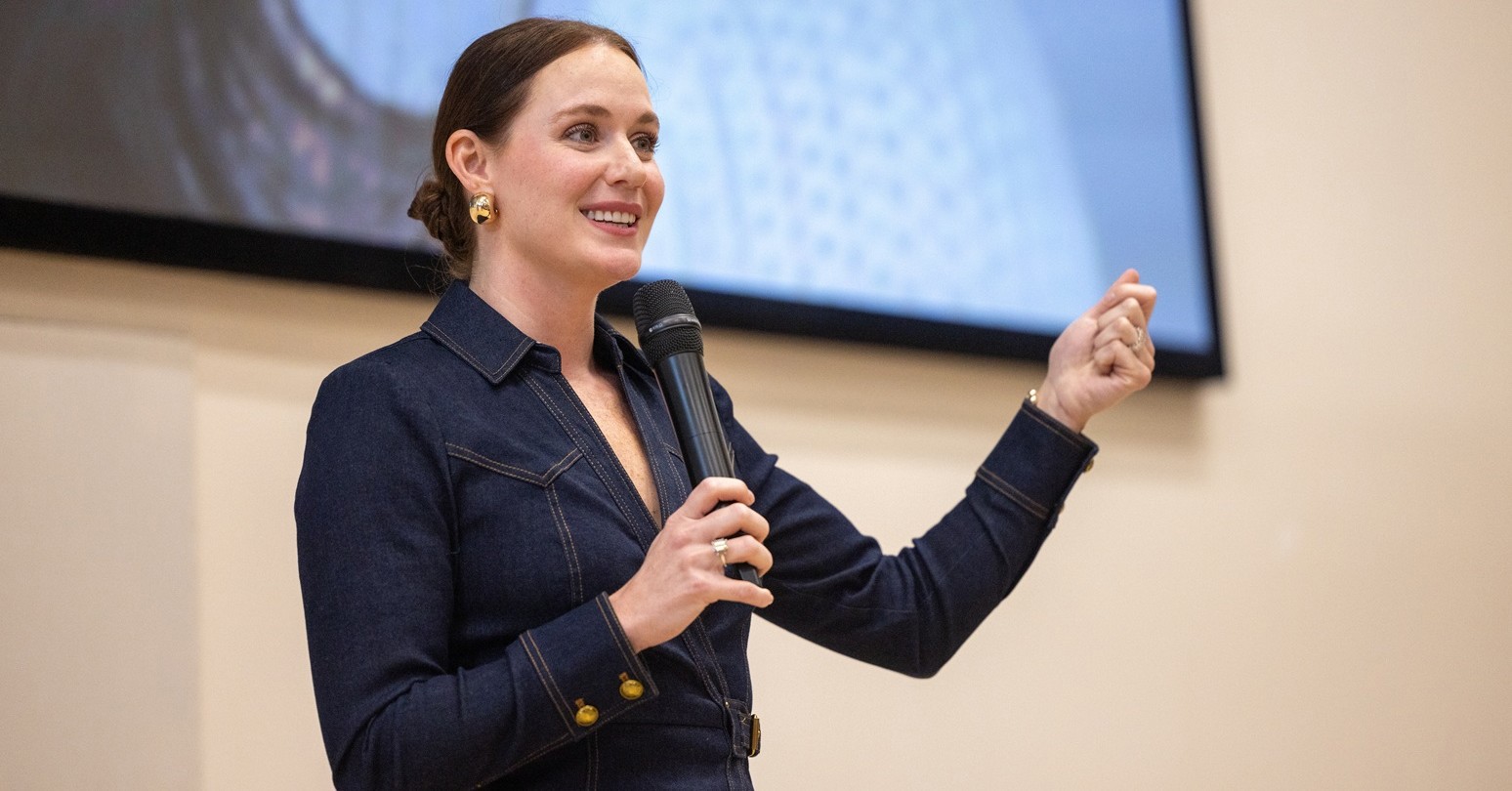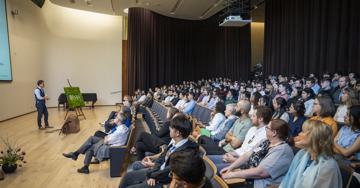Despite being the most decorated figure skater in history, with five Olympic medals, Tessa Virtue didn’t discuss her triumphs, but instead surprised Ivey’s HBA Leadership Day audience by admitting she didn't always love skating.
“I think there’s a misconception, especially with athletes, that they must love what they do. I don’t think you have to love what you do to be great, but I do think you have to have meaning," she said.
In her keynote to HBA1 students, Virtue didn’t sugarcoat the grind of chasing perfection, the systemic toxicity that can be present within sports’ communities and culture, or the toll of injuries and pressure. Instead, she offered a rare window into how she rebuilt her relationship with her sport – and, in the process, herself.
The event was part of HBA Leadership Day, hosted by the Ian O. Ihnatowycz Institute for Leadership, which helps students reflect on who they want to be as leaders. Dean Julian Birkinshaw reminded them in his opening remarks that Ivey’s emphasis on character is a key differentiator and especially important in today’s business environment.
“Elevating character alongside competence is not only a strategic imperative, but also a social responsibility,” he said. “Strengths such as courage, resilience, integrity, empathy and self-awareness, amongst others, can be activated at the right times and in the right amount to the betterment of the organization, the individual, and the community.”
Dusya Vera, PhD ’02, Professor of Strategy and Executive Director of the Ian O. Ihnatowycz Institute for Leadership, emphasized that character is not fixed, but developed through practice, feedback, and reflection – the very processes students experience in the classroom and in events like Leadership Day. Beyond the keynote, the day included a morning panel, mini-case discussions on leadership crucibles, and a Leadership Café where students could engage with guests.
Lessons from Tessa Virtue’s three Olympic chapters
Chapter 1 – Naïve ambition (Vancouver 2010)
As underdogs, Virtue and Scott Moir won gold skating with a sense of freedom. But success came at a price: Virtue had undergone surgery for chronic exertional compartment syndrome and struggled to walk without pain in the months leading up to the Games.
“I was in so much pain that I was counting the steps from the village to the cafeteria. If I walked the 272 paces, I wouldn’t be able to practice,” she said.
The physical and emotional strain also tested her partnership with Moir, teaching them early lessons in accountability and communication.
Chapter 2 – Win at all costs (Sochi 2014)
Success in Vancouver brought pressure, rivalry, and disillusionment.
“Things crumbled. The trust, the communication, this code of respect we had built within our team was dismantled,” she said.
Although they won two silver medals, the victories left them unfulfilled and exhausted enough to retire.
“We had totally lost the joy in skating. We had completely lost our purpose,” Virtue said.
Chapter 3 – Redefining success (PyeongChang 2018)
Still driven, Virtue and Moir returned from retirement with a new approach: prioritizing recovery, surrounding themselves with experts, and shifting their mindset from the pursuit of perfection to the pursuit of excellence.
“Excellence to us was showing up and being an eight out of 10 every single day. That was sustainable,” she said.
They also reframed failure through deliberate practice.
“We gave our coach a whistle, and every time she blew it, we would fall and get back up. With each recovery, I gained confidence. I knew exactly what I would do in the worst-case scenario. It took the power away from that,” she said.
By the end of her Olympic journey, Virtue no longer endured skating out of discipline, but had begun to embrace it with purpose.
Lessons beyond the ice
Since retiring from competition, Virtue has earned graduate degrees in business and positive psychology and now serves as an Executive Advisor with Deloitte, working with senior leaders and clients to unlock potential and sustain high performance. She told the students many of the tools she honed in sport – such as authenticity, accountability, and optimism – translate directly to business.
She also described how the constant feedback loop of sport shaped her perspective and said that any team that wants to be better should frame feedback as a gift.
A broader conversation on leadership
Virtue’s keynote built on themes from the morning panel featuring Franca Gucciardi (COO, CIFAR), Jeannine Pereira, HBA ’95 (EY Canada), and Rashid Wasti, EMBA ’03 (Landmark Group).
Pereira emphasized the importance of humility and growth.
“Feedback doesn’t always come wrapped the way you want it, but it’s a gift,” she said.
Gucciardi reminded the students that leadership is less about having all the answers and more about creating the conditions for others to thrive.
“It’s not about being the smartest in the room,” she said. “It’s about giving people the support and conditions to succeed.”
And Wasti highlighted resilience and adaptability.
“There is no substitute for excellence. But you also need to listen deeply, learn constantly, and preserve your uniqueness as you grow,” he said. “Being a leader is hard work … You sometimes have to do things that don’t feel natural.”
Finding purpose in the everyday
Virtue closed by encouraging the students to think about their own “why” as they begin their leadership journeys, challenging them to define success not by outcomes, but by finding purpose.
“Are you chasing perfection or excellence? Are you ready to be comfortable in the uncomfortable? How do you find meaning in your everyday lives?,” she asked. “You won’t fail if you launch fully into the process with meaning … That’s what allows you to thrive.”

L-r: Dusya Vera, Franca Gucciardi, Jeannine Pereira, and Rashid Wasti



